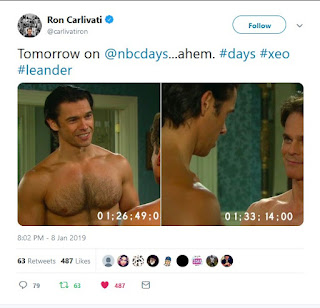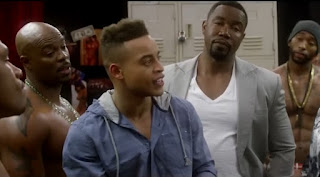DVD Review - Love or Whatever
.bmp) |
| Joel Rush (left) as Pete, a possible "manic pixie dream girl" for Tyler Poelle (right) in Love or Whatever |
This film could be accused of having a similar thing, a "manic pixie dream boy," which other critics have identified in heterosexual romances, but it doesn't seem to be as frequent as Rabin's female stereotype. One would assume that homosexual romances would demonstrate a higher incidence of manic-pixie-dream-boys, but the kind of rom-coms observed by Rabin are rarely made by queer artists or the dynamic is never truly the same.
The only recent example that comes to mind is J.C. Calciano's eCupid and the character played by Matt Lewis. Like Calciano's film, this movie's title is taken from a dating web site. The web site in this case is Grindr, a social networking app that is exclusively for gay men's smart phones. Whereas Calciano was able to integrate the web site idea into his plot, this movie only uses Grindr for a one-scene gag. Grindr is not needed at all otherwise. Grindr's use here is almost like brief product placement.
The screenplay by Dennis Bush and Cait Brennan is funny. Credit has to be given for doing a gag that is practically the same as the famous, simulated-orgasm, diner scene in When Harry Met Sally (1989), but twisting it so that it doesn't feel like a rip-off. Credit has to be given for doing a Rain Man (1988) gag as well but with fallen pretzels.
Credit should also be given for doing something that I've rarely seen in movies. So often, so many films involving same-sex, male couples will have a man break up with his girlfriend, or wife, only to be with a second man, as the first man is discovering his homosexuality. This movie has instead the two men break up, only to have one of the men go and be with a woman, as he is discovering his bisexuality.
.bmp) |
| David Wilson Page as "Jon" - a young man who discovers he also likes women in Love or Whatever |
The most popular example might be Colin Farrell in A Home at the End of the World (2004). Other recent examples include Cameron Scoggins in The Happy Sad and Chris Graham in Leather. This film adds yet another, true bisexual to the short list. His coming out as "bi" climaxes in a very hilarious line, but the scene leading up to that line is handled with a sense of seriousness as not to mock bisexuality, which is appreciated.
Strangely, the actor playing the bisexual is similar to the actor playing the manic-pixie-dream-boy or MPDB in that the assumption about them is a very superficial one. The bisexual and the MPDB are both well-muscled hunks who spend many of their scenes shirtless, so one might dismiss them as only being eye-candy and nothing deeper.
Yet, the two actors, David Wilson Page who plays the bisexual and Joel Rush who plays the MPDB, both have a charm to them that elevates their characters above just being beefcakes. The screenplay aides them to convey an intelligence to their characters as well. Tyler Poelle stars as Corey, a psychotherapist who is the protagonist similar to the ones identified by Rabin. He's in between the bisexual and the MPDB and is pulled along the usual rom-com steps and traps, but the comedic bits he's given carries him through.
.bmp) |
| Jennifer Elise Cox is hilarious as "Kelsey" in a scene from Love or Whatever |
Rounding out the cast, in more ways than one, is Jenica Bergene who plays Melissa, one of Corey's patients who has dealt with her recent issues by getting breast implants. There are also several cameos that are funny, including that of Gary Entin and Edmund Entin, the acting and filmmaking twins who made one of my favorite movies last year Geography Club.
Director Rosser Goodman shoots this movie pretty flatly, probably lighting for 360-degrees. This isn't typically bad, but it draws no attention to itself. Aside from a montage between Poelle and Rush, Goodman does nothing signatory. She simply moves the story along steadily.
Four Stars out of Five.
Not Rated but contains sexual content, nudity and language.
Running Time: 1 hr. and 24 mins.
.bmp) |
| Entin twins make a cameo in a scene from Love or Whatever |










Comments
Post a Comment